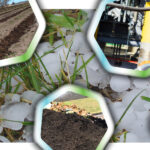
Nora Goldstein
BioCycle January 2015
It’s the first week of January, so as the Organics Recycling Authority, we are making the following forecasts for 2015:
Continued Progress: Organics recycling will continue to be robust in 2015. This January issue of BioCycle is chock-full of articles and news that reflect the continuing progress. From community-scale to large-scale, composters are diverting increasing volumes of source separated organics, and a growing number of municipalities are testing out residential food waste collection.
Celebrating Soil: The United Nations General Assembly declared 2015 the International Year of Soil. We predict more attention will be paid to the wonders of compost in building healthy soil to grow nutritious food, manage storm water, sequester carbon, etc.
Adoption of New Food Recovery Hierarchy: Over the past few years, there has been much of conversation about revising the U.S. EPA’s Food Recovery Hierarchy (www.epa.gov/foodrecovery). In 2014, Brenda Platt, Co-Director of the Institute for Local Self-Reliance, introduced an alternative, which BioCycle finds very worthy of consideration. Titled “Hierarchy For Reducing & Recycling Food Scraps & Other Organic Discards,” the inverted triangle has source reduction at the top, followed by edible food rescue, residential backyard composting, small-scale decentralized composting, centralized composting or anaerobic digestion, mechanical biological mixed waste treatment and lastly, landfill and incinerator.
Less Wasted Food: We are entering 2015 with incredible and exciting momentum to reduce the volume of wasted food in the U.S., and increase the amount of edible food that is donated. Tools like U.S. EPA’s Food: Too Good To Waste are being used by more households and municipalities. Major companies in the food supply chain are plugged in. In fact, in its top trends for 2015, the National Restaurant Association reports that “food waste reduction and management is at the forefront of restaurant operations. Composting, recycling and donating are all tactics of food waste [reduction] strategies tying into both sustainability and social responsibility.”
Improved Compostable Products Labeling: Organics recycling coordinators, source separation trainers, food scraps haulers and composters are in agreement that products certified as compostable are consistently and obviously labeled as such. The Biodegradable Products Institute, the Foodservice Packaging Institute and individual companies have heard the message.
No Scrap Left Behind: It will take every ounce of organic “waste” generated to meet the demand for the high value outputs of organics recycling — compost, biogas, digestate, biosolids, reclaimed water, etc. These outputs are key components to building climate resilient communities. No scrap can be left behind. This will become increasingly obvious in 2015.









